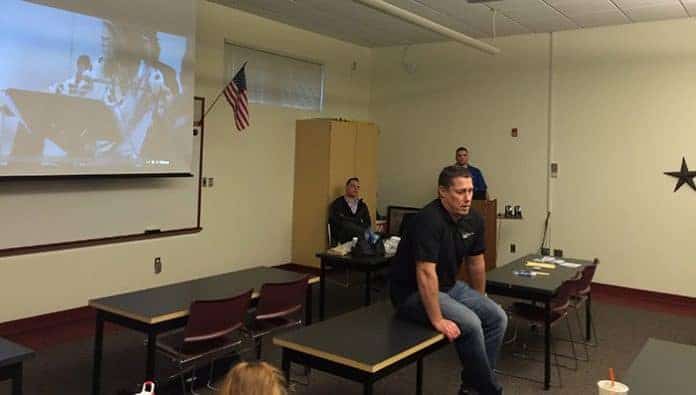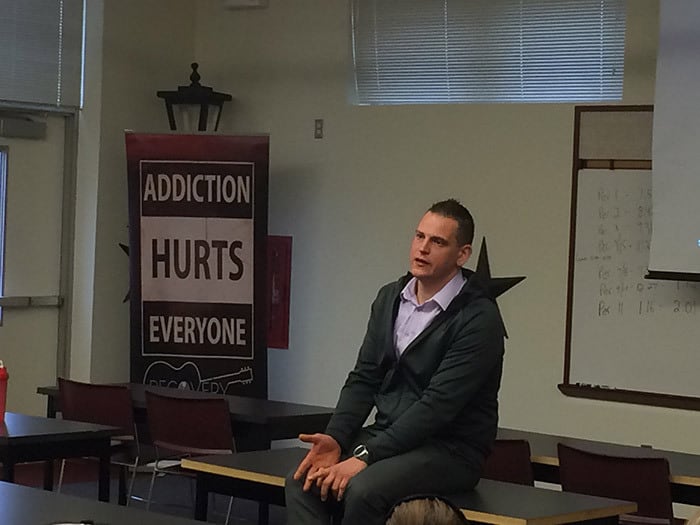
BERKELEY – The message was pretty clear: If you have a problem with drugs or alcohol, you need to talk to somebody.
Talking to people and getting to know your feelings are ways to keep addiction from getting a hold on you, said Lee Platt, a national interventionist and peer recovery specialist who was brought in to Central Regional High School for the #NotEvenOnce program. He said that most students are very responsive. They ask about how many times he had to go through rehab before he was successful and if it was hard to get sober.
#NotEvenOnce is a hashtag-friendly mission which started by Manchester Police and has spread to other towns to address the drug problem in a new way in schools. It involves police bringing real information about how the drugs are affecting young people today. There are a series of classes, and then recovered addicts come and talk to the students directly.
Police Chief Karin DiMichele said that the program has been well received by the students, and her officers have embraced the program. Mayor Carmen Amato has been supportive of the department starting this.
The program consists of three classes for seniors, Berkeley Patrolman Scott Selby said. However, there is talk of providing it to younger high school kids.
“It’s not a 17- and 18-year-old problem, it’s a 14- and 15-year-old problem,” he said.
The program covers a lot of areas, including the cycle of addiction that’s been prevalent in Ocean County: prescription painkillers leading to heroin and fentanyl. A $30 pill on the streets is more expensive than a $5 bag of heroin, so people slip into the harder stuff, he said. Some are just getting hooked from taking pills at a party.
They show a YouTube video of an addict going through withdrawal to try to get rid of the idea that quitting is easy, he said.
The problem might not be visible to everyone, but it’s there. In Berkeley, there were 18 overdose deaths in 2016, Selby said. There were 14 in 2017. First responders are now armed with Narcan, the lifesaving chemical nasal spray that temporarily blocks the effects of opioids. Berkeley estimates that they’ve had more than 30 Narcan reversals last year.
Central is a regional school district, accepting students from four other towns in addition to Berkeley: Ocean Gate, Island Heights, Seaside Heights and Seaside Park. The above figures are just for Berkeley, and don’t take into account the other four towns.
“It’s eye-opening, to say the least,” he said.
Some of the students get emotional in class, as it inevitably hits home. Someone always knows someone else who is struggling with addiction, or who overdosed, he said.

Platt, the peer recovery specialist, sat on a desk and told the students he was one of those people who has a gene for addiction.
“I was the first one to a party and the last one to leave,” he said.
A sports injury caused him to get some prescription painkillers, and he became hooked. It jeopardized everything, including his job with the Seaside Heights police.
“I didn’t want to feel,” he said. He used drugs and alcohol to numb everything. It caused his divorce and made family relationships difficult. “I wasn’t feeling emotions at all.”
He urged students to recognize their feelings and talk about them. This isn’t the time to be macho. If people are in touch with their emotions, they realize why they behave in self-destructive ways.
“Outside of the drugs and alcohol, we have ourselves,” he told a silent room.
“You can be in a room with 1,000 people and still feel alone,” he said. “They need to talk to somebody.”
Joe Solack, a recovery coach, was the next person to talk to the students.
“I’m Joe and I’m definitely an addict,” he said. “I remember when I was in your seats. I thought it was such a big joke. I’ll never be like that.”
Solack described what he was like in high school: Playing sports, living in a big house with a fairly established name, dating the most popular girl in school.
No one thought he was going to be the person doing drugs. The people you expect to become addicts wind up doing all right and the people you expect to do well wind up on the street corner.
“Drug addiction is not a homeless guy in a dumpster,” he said.
Flash forward to trying to hold down a job as a mechanic while being an addict, coming to work high, and winding up pinned between dump truck parts.
He said he is lucky to be sober now. Others he knew were not so lucky.
“Two weekends ago, I buried a friend of mine,” he said.
He had been through rehab a few times. Platt had even arrested him once. He compared it to getting a tune-up before going back out and starting again.
His mother told him “I don’t want to go into your room to wake you up and you don’t wake up.” That still wasn’t enough to get clean.
Then, there was a moment of clarity where he realized the next stop was either a seizure from withdrawal, being institutionalized, or death. He called Platt and asked for help.
“There is a way out. There is hope,” he said.






